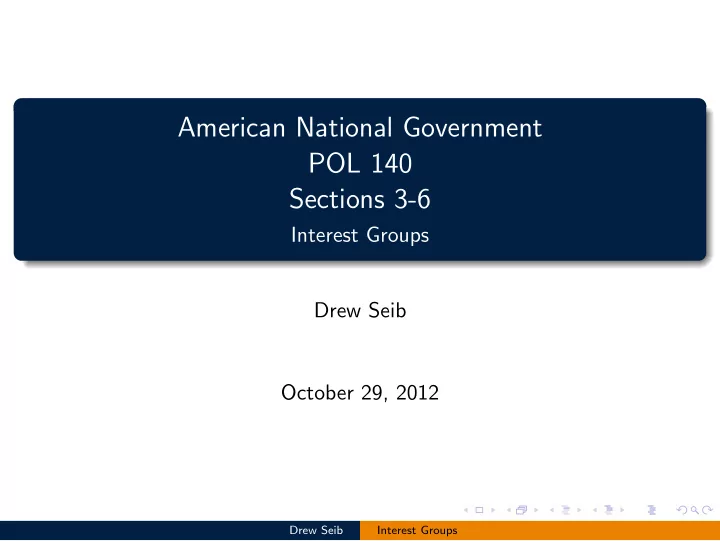

American National Government POL 140 Sections 3-6 Interest Groups Drew Seib October 29, 2012 Drew Seib Interest Groups
Announcements Updated Syllabus on Blackboard. Make sure you use THIS syllabus. Paper Due Date Exam 2 Date Extra Credit-Thursday, October 25 at 7:00PM in second floor lounge of Regent’s College Drew Seib Interest Groups
Goals Interest Groups Economic Groups Citizen Groups Resources Lobbying Drew Seib Interest Groups
Basics Interest Group: any organization that actively seeks to influence public policy. Not all interest groups are political parties. All political parties Interest Groups are interest groups. What are the similarities and differences between Political Party political parties and interest groups? Drew Seib Interest Groups
Type of Interest Groups Economic Group: Interest groups that are organized primarily for economic reasons and engage in political activity in order to seek favorable policies from government. Citizen’s Group: Interest groups formed by individuals drawn together by opportunities to promote a cause in which they believe but does not provide them significant economic benefits. Drew Seib Interest Groups
Collective vs. Private Good Public Good: Benefits that are offered by groups as an incentive for membership but are not non divisible and therefore available to nonmembers as well as members of the particular group. Private Good: Benefits that a group can grant directly and exclusively to the individual members of the group. What are some examples of private and public goods? Is it provided by an economic or citizen’s group? Drew Seib Interest Groups
Free Riders Free-Rider Problem: individuals can obtain a good even if they do not contribute to the group’s effort. Example: NPR (National Public Radio) Provides radio programs to its listeners. Depends of contributions from its listeners. Listeners who do not contribute can still listen to NPR’s radio programing. Other examples? Drew Seib Interest Groups
Advantages and Disadvantages of Economic and Citizen’s Groups What are the advantages and disadvantages of economic and citizen’s groups? Drew Seib Interest Groups
Lobbying Lobbying: a group’s effort to influence public policy through contact with public officials Inside lobbying Outside lobbying Drew Seib Interest Groups
Inside Lobbying Inside Lobbying: Direct communication between organized interests and policymakers, which is based on the assumed value of close (“inside”) contacts with policymakers. What benefits do lobbyist have to offer public officials? Revolving door Congress Jack Abramoff The Presidency Federal agencies The Supreme Court Amicus curiae brief: Meaning “friends of the court,” these are documents submitted to the court explaining a group’s position on a legal dispute before the court. Drew Seib Interest Groups
Iron Triangle Iron Triangle: The small and informal but relatively stable set of bureaucrats, legislators, and lobbyists who seek to develop policies beneficial to a particular interest. Congressional Subgroup (ex. Naval Affairs sub- committee) Government Agency Interest Groups (ex. (ex. Procurement defense contractors) Division, U.S. Navy) Issue Networks: an informal grouping of officials, lobbyists, an policy specialists who come together temporarily around a policy problem. Drew Seib Interest Groups
Outside Lobbying Outside lobbying: A form of lobbying in which interest groups seeks to use public pressure as a means of influencing public officials. Grassroots lobbying: A form of lobbying designed to persuade officials that a group’s policy position has strong public support (ex AARP). Political Action Committee (PAC): The organization through which an interest group raises and distributes funds for election purposes. Super PACs: Also known as independent expenditure only committees Money raised and spent this year Cannot coordinate with candidates Reporting of donors The biggest difference between PACs and Super PACs is the inability of Super PACs to donate to candidate’s campaigns. Drew Seib Interest Groups
Representing the Interest of Whom? Pluralist Theory of Power: A theory of American politics that holds that societies interests are substantively represented through the activities of groups (interest groups rule). What are the short comings or underlying assumptions of pluralist theory? Interest group liberalism: the tendency of officials to support the policy demands of the interest groups or groups that have a special stake in the policy. Drew Seib Interest Groups
Chapter 9 Quiz Chapter 9 quiz is due by next class period Drew Seib Interest Groups
Recommend
More recommend